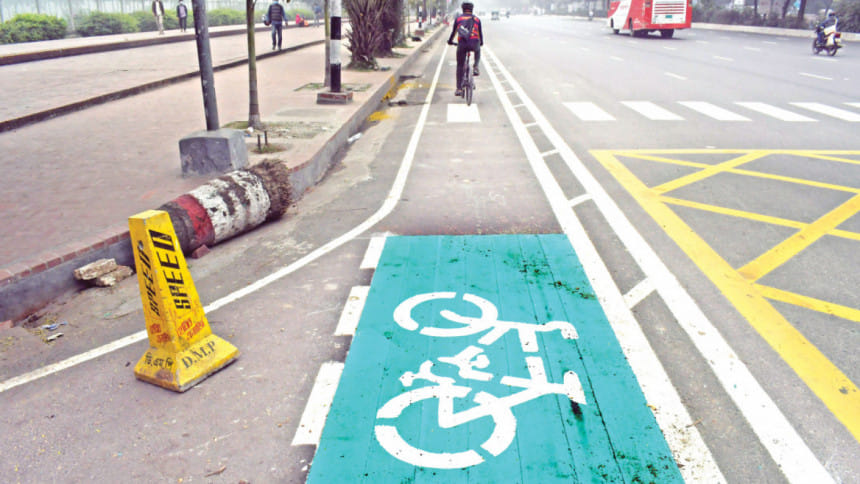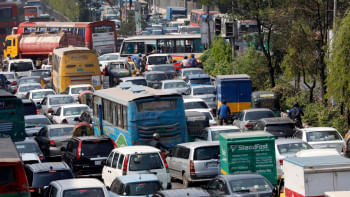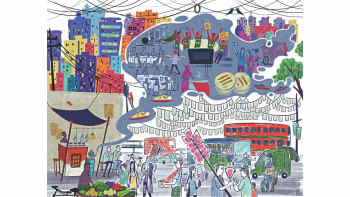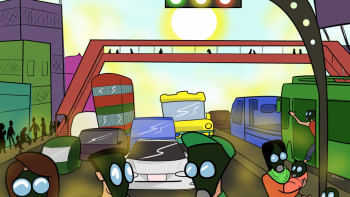Why Dhaka should invest more in bicycle lanes

Inflation is making people's lives harder in many ways. This is making it increasingly important to find effective ways to help people save money. Better yet, though almost too good to be true, would be if we could help people save money while also tackling other major problems such as air pollution, noise pollution, road crashes, and the climate crisis. Fortunately for us, there is an amazing and surprisingly simple tool available: the bicycle.
When we start to enumerate the economic (and other) benefits of the bicycle, it is easy to keep going and going – pedalling our way to a better and brighter future. High-density, cycle-friendly urban design is good for local economies. Bicycles create virtually no wear and tear for roads, thus resulting in dramatically reduced costs of maintenance. Neighbourhoods of this design also generate far fewer costs for the provision of basic infrastructure (such as water, electricity, sewage).
Cycle parking occupies very little space, and allows roughly five times as many people to access restaurants and shops than if the same space was occupied by cars. When people travel by bicycle, they become part of the surroundings, more able to notice what is around them, and getting off to enter any facility is simpler. This is why people on bicycles actually tend to spend more at local businesses.
When the main mode of transport is the bicycle rather than the car, neighbourhoods are quieter, more walkable, and have cleaner air, making them more desirable and increasing the local property value. In England, the value of residential property rises by one percent if motor vehicle traffic is reduced by 50 percent. Providing cycle parking at businesses, offices, and elsewhere is much less expensive than creating car parking areas. When children walk or cycle to school, they tend to be more attentive in general and achieve better results, which can result in future economic gains. And this also excludes the need to provide expensive school buses or for families to pay for their children's transport.
When people can move about on bicycles, they are more physically active from childhood well into old age. They stay healthier, saving the government and taxpayers expenses for health care.
Cycling infrastructure is far less expensive to build than roads, flyovers, elevated expressways, and parking garages for cars. For all these reasons and more, the benefit-to-cost ratio for cycling schemes have been estimated to range from 5:1 to as high as 35.5:1. That is, for every taka invested in cycling infrastructure, the savings can range from Tk 5 to more than Tk 35. Cycle freight (what we call "rickshaw vans") is cheaper than motorised freight for small payloads over short distances, with cost savings of 39 percent to 64 percent compared to a motorised service.
When people can walk and cycle in cities, they can more easily access public transport, too. Cycling in cities also creates a number of jobs, such as for people working to build cycles, pumping tires, repairing bicycles, or offering parking services.
With the world growing hotter, the idea of cycling may seem less and less feasible. But is the alternative any better? To sit stuck in traffic in an air-conditioned car, polluting the air further, emitting carbon dioxide, and contributing directly to heat increase through the working of the engine and AC? Yes, it's harder to cycle when it's really hot. But the way to cool down cities is to have plenty of trees (and if car parking did not occupy so much urban space, there would be more scope for planting trees, too). More bicycles and fewer cars could mean more parks, canals, ponds, trees, and dirt – all of which would cool a city. And bicycles generate virtually zero climate emissions anyway.
Why then does our government subsidise cars while maintaining high taxes on bicycles? Unfortunately, the lobbying of car, fuel, and road-building corporations – the three-headed monster – is powerful while that of cycle companies is not. That is where our voice comes in: whether or not we ride bicycles, we need to demand something better from our politicians and policymakers. The benefits of cycling extend well beyond the individual cyclist and to the community and the greater society. We all need to advocate for better cycling infrastructure.
As we struggle to cope with inflation on top of all the problems we face in our cities, let's remind ourselves, each other, and particularly our policymakers of the many benefits that would ensue to our economies, our cities, and our lives if we invested more in cycling. It is time to make bicycles affordable and cycling pleasant and safe in our cities.
Debra Efroymson is executive director at the Institute of Wellbeing. Watch her TEDx talk on the topic.

 For all latest news, follow The Daily Star's Google News channel.
For all latest news, follow The Daily Star's Google News channel. 












Comments